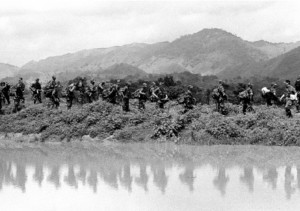 My article “Grassroots Masquerades: Development, Paramilitaries, and Land Laundering” was just published by Geoforum. The article will be out in hardcopy in Volume 50 (December 2013), but it’s already available online. The first version of the article was presented at the Second Conference on Global Land Grabbing at Cornell University. I also presented a draft as part of the seven-part Violence and Space sessions organized by Philippe Le Billon and Simon Springer during the Association of American Geographers meeting in Los Angeles. Below is an abstract of the paper.
My article “Grassroots Masquerades: Development, Paramilitaries, and Land Laundering” was just published by Geoforum. The article will be out in hardcopy in Volume 50 (December 2013), but it’s already available online. The first version of the article was presented at the Second Conference on Global Land Grabbing at Cornell University. I also presented a draft as part of the seven-part Violence and Space sessions organized by Philippe Le Billon and Simon Springer during the Association of American Geographers meeting in Los Angeles. Below is an abstract of the paper.
This article shows how paramilitaries and allied companies put grassroots development discourses of political participation and subsidiarity, environmental conservation, and ethnic empowerment to work in executing and ratifying their massive land grab in northwest Colombia. More than a case of trying to “whitewash” their malfeasance with fashionable and politically correct development-speak, I argue that the grassroots development apparatus—its discourses, institutional forms, and practices—became utterly instrumental to the illegal land seizures. Moreover, when operating alongside practices of land parcelization, iterative transactions, producers’ cooperatives, and third-party intermediaries, grassroots development facilitated what could be called “land laundering.” In the process, grassroots development became a conduit for paramilitary-backed state formation in which projects of liberal governance commonly associated with the imperatives of institution building, good governance, and the rule of law became perversely compatible with the region’s economies of violence. With the World Bank increasingly concerned over the conflation of fragile states, violent conflict, and alarming land grabs, this article raises questions about how the grassroots solutions currently being endorsed by the Bank can in some cases actually facilitate dispossession, illicit economies, and violent political projects. The way paramilitaries harnessed grassroots development also has critical implications for debates about post-development.
Email me teo@nacla.org if you’d like a copy of the article and do not have access to the journal.
